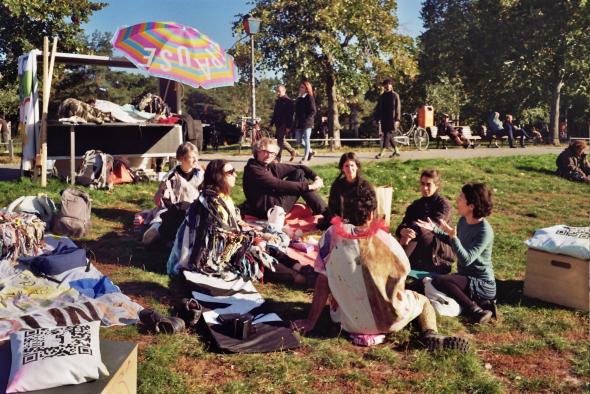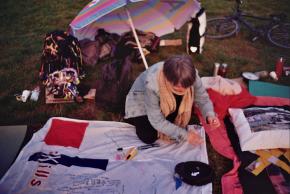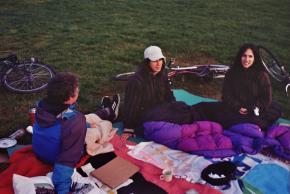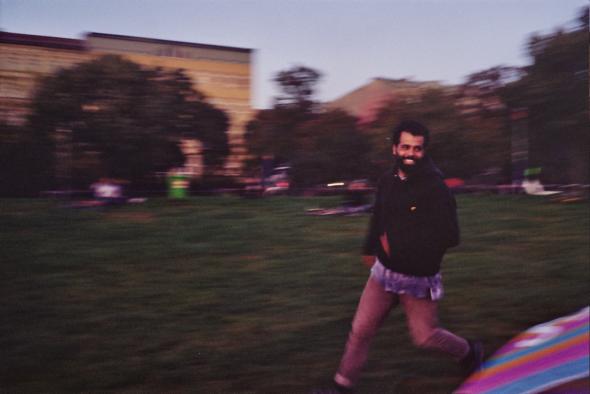Pandemic and art: Facing (again) a “collective isolation” - a dialogue with Berlin-based artist Marta Stanisława Sala
Berlin-based Polish artist Marta Stanisława Sala, together with German artist Johanna Reichhart and several ex-schoolmates from Universität der Künste Berlin’s Art in Context MA programme, has undertaken a collaborative initiative to make a “break” from “work” in an artistic context, “Arbeitspause im Görli - Künstlerische Beziehungssysteme im Öffentlichen Raum” (“Work Break at Görli - Artistic Relationship Systems in Public Space”).

The aim is clear: to “work” on something together with participants and the park’s visitors, so that a “break” would be possible. Work must precede the break as “Arbeitspause” is different from the English phrase “work break.”
Inspired by the idea and academic concept of “commoning,” Sala co-hosted the first round of events at Berlin’s Görlitzer Park (nickname “Görli”) with different topics for each of five “actions”: “Common Ground” (2nd of September 2021), “Common Skills” (23rd of September), “Common Surviving” (25th of September), “Common Nap” (30th of September), and “Artists’ Commons Parade - Feierabend” (9th of October. “Feierabend” means the end of a working day in German).
Sponsored by Berlin’s Bezirk Friedrichshain-Kreuzberg (Friedrichshain-Kreuzberg District Administration) and Landeskommission Berlin gegen Gewalt (Commission of the Berlin State “Berlin against Violence”), “Arbeitspause im Görli” attained another layer of meaning: to diversify Görlitzer Park’s usage and to enhance Berliners’ social engagement in the park. The initiative is significant as Görli is one of the few parks in Berlin where tolerated drug dealers and patrolling police officers co-exist.
In this particular context, a complex constellation of participating artists “doing something together,” concretizing several academic theories and carrying out administrative tasks - such as organizing artists, guests or a random passerby, being mindful of social and intellectual inclusiveness - was constantly in question.
The following dialogue was conducted after the very first action. “Common Ground” was a reading session in which organizers and participants from different cultural backgrounds and with different native languages faced the problem of translation and the complicated, thorny question of language hierarchy in academia (and thus, a hierarchy of ideas). In this dialogue, now reproduced in the written form of an interview, Sala had fulfilled her genuine wish to break the “collective isolation” that many people - including artists - have been facing until now.
A translation of the same dialogue was published in Taiwan’s art magazine “Insular City Zine” (Taiwan-Chinese-Mandarin version) and in Hong Kong’s “The News Lens” (Hong Kong-Chinese-Cantonese-Mandarin version) with the English title: “‘Break’ and ‘work’: a short discussion on ‘Arbeitspause’ with Berlin-based artist Marta Sala.” After these publications, Sala invited me to be an active participating artist and visual anthropologist for the project, for which I was granted the status of “freelance artist” and “freelance anthropologist” by the Berlin Immigration Office.
As winter approaches, the above mentioned “collective isolation” touches many - both “insiders” or “outsiders” in many different “areas.” I humbly hope that this dialogue, or interview, which was kindly proofread by American writer Dayoung Lee, could become part of the many Berlin voices dedicated to collective, global action, regardless of form or our different backgrounds.


The project seems to be a direct reply to the Corona crisis, lockdowns and the subsequent existential questions raised for all, including artists. Arbeitspause (literally “work break”), in German is very ambiguous. For some, it could mean a sort of leisure. For another, it could also imply unemployment. What brought you to this project and how do you work this Pause as Arbeit in order to simultaneously enhance your creative and artistic productivity and raise awareness of the importance of break?
First of all, I would not say that it is a reply to the “crisis,” but rather an attempt to do something for the good of the community, for the common, or its commoning. I have had luck and privilege to experience Corona not so much as a crisis in its literal sense. Many would also agree with me as we live in Berlin, a relatively rich city where we had such privilege, or even luxury, to stay safe and calm.
Furthermore, one needs to define or even redefine what a Pause means in this particular context of artistic practice. After all, this German expression is “Arbeitspause.” Pause is subject to Arbeit, a break from work, Arbeit temporally, spatially and emotionally defining Pause. It thus also raises the question whether this artistic project or artistic work in general is Arbeit at all? As very often artistic work is not considered to be something “serious.”
Here in German, work as passion or love or a profession gives a large room for interpretation.The term “Reproduktionsarbeit” (literally “reproductive occupation,” but meaning, ex. parenting) might illustrate the openness very well. Moreover, given the interchangeability of “work” in an artistic context with, for example, “work” from “housework” or even “love,” such comparison with productivity, even as the connotation comes with the word “work,” seems to me dangerous. For example, when we observe love as work, how much would it cost for a mother’s hug or intimacy with someone you love?
Another question is, how people were able to afford this Pause in the ongoing pandemic. Since its meaning varies in each particular personal context, Pause from work could be a personal catastrophe or leisure, to use your word. With the official and bureaucratic status of “artist,” I was financially supported by the German federal government during the lockdown. But the emotional breakdown, provoked and sustained by social isolation - and I should repeat that we are privileged to worry about not much more, has proposed a need to rethink not only what work or Pause is in an artistic context, but also what Freizeit (free time) is. Art is not about creating alone and then consuming alone. It is a sort of social life; it is about the social actions between the creator and the consumer.
Thus, we are here to work with the community in order to create a Pause that in turn generates this “Work-Break” circle.

In the European linguistic context, “Arbeit” (German), “praca” (Polish), and “work” (English) seem to me much more ambiguous than, Cantonese, for example, in which “工夫” often refers to a labour-money exchange. Back in the European linguistic context, it seems to me that “work,” involving money or not, is an exchange of labour for a certain compensation. Even when one talks about love - both exclusive and polygamous relationships - the word “work” can be used to describe non-monetary exchanges. In this particular sense of “work” with all its ambiguity, what is the meaning of Pause? This question has been troubling me since I was thinking in an exclusive way with Pause as a part of work and pauses enhancing productivity.
I think in some sense, the English word “break” or the Polish “przerwa” makes it clear that to pause is also to break (something). If we talk about it etymologically, I can continue to romanticize the link with “breakdown” such as the emotional breakdowns that I had, as many others did, during several hard lockdowns. As I said, art making is a social life, composed of social interactions that we need to urgently gain back even before the complete end of the pandemic - if that is possible at this point.
This project is, therefore, enabling the meeting and exchange of these various thoughts, considering what a break may be, as well as catalyzing an artistic creation or reaction to the meanings related to pleasure or rest. If I speak in a selfish way, all the Corona measures have been making indoor art presentations virtually impossible, and thus the project is also driven by an existential concern for us artists who need human contact not only on the emotional level but also on a very practical one. But somehow the project presents a very good chance for us to rethink the theories on how to utilize existing public or semi-public spaces for an artistic - or to say it more directly, professional - purpose.
In this sense, “Gemeinschaffen,” or in English “commoning,” is to be practiced in its most literal sense: to do something together. Together with Costanza Rossi from Chile, Johanna Reichhart, from Germany, Marcos García Pérez from Spain, and other local and international participants like my sister Katarzyna and you from Macau. We organize to make this Pause happen, specially in this sense of a break which is subject to work. Without work, Pause would not make sense. We have different artistic concerns in theoretical terms and practical skills if we speak about our art, like textiles in my case. But the main thing is to take time, to work together, to reflect together on the process, so that a Pause becomes possible.
Let us then continue to discuss some other important theoretical and practical aspects of this ongoing artistic practice of “commoning.” Dziękuję!
With pleasure, dziękuję too!
Photos: Cheong Kin Man